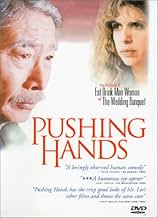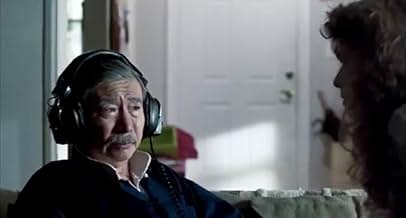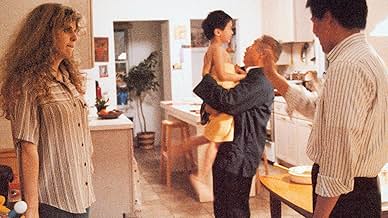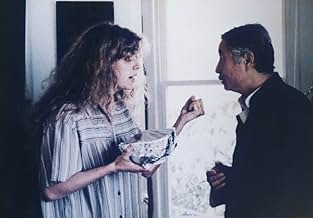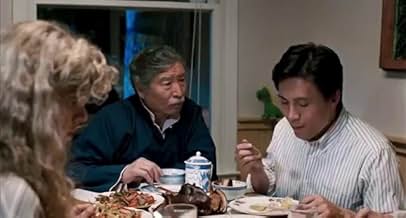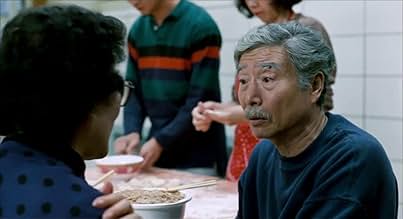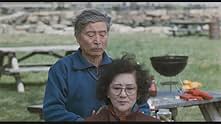AVALIAÇÃO DA IMDb
7,2/10
5,1 mil
SUA AVALIAÇÃO
Mestre Chu, um mestre de Tai-chi aposentado, se muda da China para os EUA para morar com o filho, sua nora americana, e seu neto. Mas Mestre Chu enfrenta dificuldades para achar seu lugar ne... Ler tudoMestre Chu, um mestre de Tai-chi aposentado, se muda da China para os EUA para morar com o filho, sua nora americana, e seu neto. Mas Mestre Chu enfrenta dificuldades para achar seu lugar nessa nova e estranha cultura.Mestre Chu, um mestre de Tai-chi aposentado, se muda da China para os EUA para morar com o filho, sua nora americana, e seu neto. Mas Mestre Chu enfrenta dificuldades para achar seu lugar nessa nova e estranha cultura.
- Direção
- Roteiristas
- Artistas
- Prêmios
- 6 vitórias e 7 indicações no total
Bozhao Wang
- Alex Chu
- (as Ye-tong Wang)
- Direção
- Roteiristas
- Elenco e equipe completos
- Produção, bilheteria e muito mais no IMDbPro
Avaliações em destaque
Ang Lee's first feature film, compared to "Eat Drink Man Woman," is a bit too neat and plain, but it still possesses the characteristic traits of Lee's later films - quiet and plain, yet captivating. It's truly miraculous that if this son were placed in another director's film, he would undoubtedly be detested, yet under Lee's direction, he evokes a sense of weakness without crossing into detestable territory. "The sun is shining, and I just want to stand here for a while. After all, no one is waiting for me. I'll forget about it after standing here for a while." This reminds me of my grandmother, who moved from her hometown to the city and struggled to adapt. Two weeks later, she insisted on going back. During most of the daytime, she would just sit on the balcony, soaking up the sun. I wonder what she was thinking at that time. Initially, I thought it was about cultural barriers, but later I realized it was much sadder. Cultural barriers can be temporarily overlooked through the efforts of both sides, but time and aging are forces that cannot be resisted.
The adage of "Great things come in small packages" aptly applies to PUSHING HANDS/TUI SHOU. The film deftly tells its story with charm, humor and grace. A son's elderly father is the newest part of the family, and troubles therein lie. Essentially, it's a story of one family, yet could easily fit into many households. So many topics are breached, under the gentle, loving eye of the director (Ang Lee). The leads, the venerable Sihung Lung, Deb Snyder and Bo Z. Wang, do a credible job bringing this story to life. Recommended.
'Pushing hands' refers to an exercise in tai chi where lightly touching each other, two practitioners learn to yield to and redirect a shared flow of energy. It's actually at the core of tai chi, a Chinese form of boxing built around Taoist principles of interconnected balance of opposites and emptiness in form.
Nearly impossible to make sense of in film, as is meditation and other internal arts of the East, because simply showing it, or worse in the light of mystical ability, obscures what it really is about. Ang Lee however tries in his first film, with mixed results.
Modeled to the story of an aging tai chi master who comes to America to stay with his son's family, there is what you'd expect from a film where East comes West; contrasts between two opposite ways of life, tradition versus modernity, love versus duty.
All that is pretty ordinary, and some obvious drama and questionable acting bring it further down. To be fair, for a low-budget student film, Lee shows considerable talent with a camera and has come far on this strength. All told, I'd rather celebrate his success story than Tarantino's. But let's see something more interesting from the Chinese perspective.
The overall point is finding a center of stillness in imbalanced life that is constantly in motion; in the film we see this in the old master's quest for a home and new life in a new country, somewhere to grow roots. This is the tao of balancing in the flow.
Life back in China isn't presented as ideal, we find that the old man has been persecuted all his life, and that his tai chi and calligraphy are the still spot he cultivates, his center in a moving universe of suffering. See how a phone ringing startles him from meditation, that is life that goes on.
In line with tai chi principles, all this means 'hard' in several moments of real life conflict, versus 'soft' in inwards reflection. There is a love interest in Mrs. Chen (soft, as feminine yin to his yang) who's in a similar situation as the old man and much gentle pushing and yielding to be close to her.
So how beautiful, if we could have the film as cinematic 'pushing hands' between lonely souls? And carry the flow from heavy drama to soft inner life, to what these people do to cool and express their ardor, she in her cooking, he in his calligraphy. Kar Wai makes it work, not quite so here.
Why is that? There's a scene of the old man watching videotapes of old Chinese kung fu movies, ridiculous from his perspective. The film is meant to offer next to other things a realistic depiction of his arts, fighting or otherwise, tied to realistic human connection as both soft.
But there are scenes like with the fat boy or in the restaurant, that in the end are as ridiculous as those movies, suddenly jerking us to fiction, obscuring what is vital in his art; and mirroring that, there's a sense of inflated drama in emotional moments. But Lee is too talented for us to be able to easily discard the whole work.
The Western perspective, introduced later in the film by the son, is that his father's internal arts may be his way of shutting off the outside world, keeping from being touched perhaps related to the tragic loss of his wife. All through the film, we see that he likes Mrs. Chen but is reluctant to be close to her.
Now watch again the last scene where he teaches tai chi in the Chinese community center, now the 'hero of Chinatown'. Watch how we first see him doing the motions, then with a soft flow of the camera materializes behind him as though out of thin air an entire class of students. And who enters as if by chance? Mrs. Chen.
Now 'soft' is what we see of his heart, 'hard' what we imagine as taking place in his head.
See how lightly the real and unreal touch, how smooth the parallel flow. So you can afford to miss the rest but not this last moment, it's expertly done and too delicious to ignore.
Nearly impossible to make sense of in film, as is meditation and other internal arts of the East, because simply showing it, or worse in the light of mystical ability, obscures what it really is about. Ang Lee however tries in his first film, with mixed results.
Modeled to the story of an aging tai chi master who comes to America to stay with his son's family, there is what you'd expect from a film where East comes West; contrasts between two opposite ways of life, tradition versus modernity, love versus duty.
All that is pretty ordinary, and some obvious drama and questionable acting bring it further down. To be fair, for a low-budget student film, Lee shows considerable talent with a camera and has come far on this strength. All told, I'd rather celebrate his success story than Tarantino's. But let's see something more interesting from the Chinese perspective.
The overall point is finding a center of stillness in imbalanced life that is constantly in motion; in the film we see this in the old master's quest for a home and new life in a new country, somewhere to grow roots. This is the tao of balancing in the flow.
Life back in China isn't presented as ideal, we find that the old man has been persecuted all his life, and that his tai chi and calligraphy are the still spot he cultivates, his center in a moving universe of suffering. See how a phone ringing startles him from meditation, that is life that goes on.
In line with tai chi principles, all this means 'hard' in several moments of real life conflict, versus 'soft' in inwards reflection. There is a love interest in Mrs. Chen (soft, as feminine yin to his yang) who's in a similar situation as the old man and much gentle pushing and yielding to be close to her.
So how beautiful, if we could have the film as cinematic 'pushing hands' between lonely souls? And carry the flow from heavy drama to soft inner life, to what these people do to cool and express their ardor, she in her cooking, he in his calligraphy. Kar Wai makes it work, not quite so here.
Why is that? There's a scene of the old man watching videotapes of old Chinese kung fu movies, ridiculous from his perspective. The film is meant to offer next to other things a realistic depiction of his arts, fighting or otherwise, tied to realistic human connection as both soft.
But there are scenes like with the fat boy or in the restaurant, that in the end are as ridiculous as those movies, suddenly jerking us to fiction, obscuring what is vital in his art; and mirroring that, there's a sense of inflated drama in emotional moments. But Lee is too talented for us to be able to easily discard the whole work.
The Western perspective, introduced later in the film by the son, is that his father's internal arts may be his way of shutting off the outside world, keeping from being touched perhaps related to the tragic loss of his wife. All through the film, we see that he likes Mrs. Chen but is reluctant to be close to her.
Now watch again the last scene where he teaches tai chi in the Chinese community center, now the 'hero of Chinatown'. Watch how we first see him doing the motions, then with a soft flow of the camera materializes behind him as though out of thin air an entire class of students. And who enters as if by chance? Mrs. Chen.
Now 'soft' is what we see of his heart, 'hard' what we imagine as taking place in his head.
See how lightly the real and unreal touch, how smooth the parallel flow. So you can afford to miss the rest but not this last moment, it's expertly done and too delicious to ignore.
Sihung Lung, the actor who played Master Chu, the aging tai chi master, gave a very convincing and sincere performance in this film. It was no wonder that he won the Golden Horse (Taiwan's equivalent for the Oscars) for Best Actor in this film. His performance was extremely touching, as tears jerked into my eyes as I see an aging and traditional Chinese father trying to get along with his westernized family while also trying to adjust to life in a new place and culture. The film encourages people, especially new immigrants, to emphasize and put themselves in their parents' shoes. Try to understand how difficult it is for them to come and settle in a new place and try not to push them away. Be patient with them, take a step back and everything may be better.
The movie title, "Pushing Hands", is very appropriate, as this is the term for an exercise in tai chi in which a person achieves balance by giving up balance. In this non-aggressive exercise between 2 people, a person offers no resistance at all to the pressure or push that the other person is exerting and keeps borrowing this strength until they feel they have fused into one and thus have achieved harmony. This was what Master Chu did. Although his daughter-in-law kept misunderstanding him, causing much discontent and eventually got his son to try to sent him away, he offered no resentment or a temper tantrum. He simply walked away gracefully. This action caused his son to appreciate him and remember why he got his father to live together in the first place in a tear jerking scene and finally they worked out a solution. They decided to give each other space by living separately instead of pushing each other away. In the end everyone was much happier, as even the daughter-in-law learned to accept the father, symbolized by her decorating the guest room for him and asking the question if he would ever visit. The father achieved the balance that he seek in Tai-Chi.
Ang Li is simply amazing and sensational. He did what he could with the limited budget and created a very warm and tear jerking film. Although this film was not the highest quality (the version I saw was very unclear and skips sometimes) and it could feel slow at times, especially the beginning sequence, the film was a great work in directing. The film picked up its pace after the slow beginning without any big fighting scenes or explosions and never felt boring afterwards. Also, from the beginning sequence, where he was able to show the dissension and gap between the daughter-in-law and the father by using just different scenes and visuals, to scenes throughout the film where he used lighting and different camera angles to show the internal pain and sadness that the father experience, it was, simply put, a great piece of art considering the budget. It showcased the talent of Li and gave the audience a glimpse of the man who would bring us the memorable Couching Tiger, Hidden Dragon.
The movie title, "Pushing Hands", is very appropriate, as this is the term for an exercise in tai chi in which a person achieves balance by giving up balance. In this non-aggressive exercise between 2 people, a person offers no resistance at all to the pressure or push that the other person is exerting and keeps borrowing this strength until they feel they have fused into one and thus have achieved harmony. This was what Master Chu did. Although his daughter-in-law kept misunderstanding him, causing much discontent and eventually got his son to try to sent him away, he offered no resentment or a temper tantrum. He simply walked away gracefully. This action caused his son to appreciate him and remember why he got his father to live together in the first place in a tear jerking scene and finally they worked out a solution. They decided to give each other space by living separately instead of pushing each other away. In the end everyone was much happier, as even the daughter-in-law learned to accept the father, symbolized by her decorating the guest room for him and asking the question if he would ever visit. The father achieved the balance that he seek in Tai-Chi.
Ang Li is simply amazing and sensational. He did what he could with the limited budget and created a very warm and tear jerking film. Although this film was not the highest quality (the version I saw was very unclear and skips sometimes) and it could feel slow at times, especially the beginning sequence, the film was a great work in directing. The film picked up its pace after the slow beginning without any big fighting scenes or explosions and never felt boring afterwards. Also, from the beginning sequence, where he was able to show the dissension and gap between the daughter-in-law and the father by using just different scenes and visuals, to scenes throughout the film where he used lighting and different camera angles to show the internal pain and sadness that the father experience, it was, simply put, a great piece of art considering the budget. It showcased the talent of Li and gave the audience a glimpse of the man who would bring us the memorable Couching Tiger, Hidden Dragon.
When I was in class that day, I asked the students what did the "pushing hand" say? Almost all of them, including those who haven't seen "Pushing Hands", answer the collision between Chinese and Western cultures, so I wonder why it is so unified. After reading Baidu Encyclopedia, I understand! What is the "homesickness" is indeed the standard of the central idea, but there is no performance in the movie, and it is not allowed to pay for the payment.
Inserting a digression, about the very interesting thing about this film, on the day of the release of "Pusher", the box office was flat. On the same day, I won nine nominations at the Golden Horse Award, and after winning the best actor, supporting actress and special prize, the box office immediately after the next day. Big rise. It seems that we have to hear about it, only to know it. After reading the comments, we know what the movie is about?
"Pushing Hands" Virgo is often the most like the author himself, so "Pushing Hands" is very good, and the sharp parts are hidden under the gentle and popular narrative.
The whole film is staring at Lao Zhu alone, so look at "Pushing Hands" and see Lao Zhu.
Taijiquan Professor Zhuo-Taiji Pusher, in the words of Lao Zhu in the film, is: We practice the inner family, pay attention to refining the spirit, practicing the spirit, and waiting for the level of refining the spirit, it is very It's hard to practice again.
Lao Zhu is an old man who admits to lose.
I practiced pushing my hand to teach Lao Zhu at this level, but I feel that life has become utterly weak.
The loneliness and emptiness faced after retirement were all due to the reason that the son came to the United States, and the son married the wife of the foreign woman. All the pressure was passed on to his son and he could see it in the next minute.
So Lao Zhu did not accept his life and wanted to fight.
Teaching Tai Chi in Chinatown, the action after meeting Chinese Mrs. Chen is completely like a boy in first love.
Later, after the hope was shattered, Lao Zhu still refused to admit defeat and left home!
This "jailbreak" failed again. In the face of the humiliation of the restaurant owner, Lao Zhu's bloody Fang's defeat of the "enemy" still lost his cultivation.
Você sabia?
- Erros de gravaçãoThe son, Alex, has physiognomy that is unmistakably that of someone Beijing, and the actor speaks with a Beijing accent, but the father, who demonstrates Taiwanese cultural practices, has the appearance of someone from farther south, such as near Shanghai. Regardless of whom the father might have married, the couple could not have produced a child with such Northern characteristics. This is a casting error more than a character error.
- ConexõesFeatured in Century of Cinema: Naamsaang-neuiseung (1996)
Principais escolhas
Faça login para avaliar e ver a lista de recomendações personalizadas
- How long is Pushing Hands?Fornecido pela Alexa
Detalhes
- Data de lançamento
- Países de origem
- Idiomas
- Também conhecido como
- Pushing Hands
- Locações de filme
- Empresas de produção
- Consulte mais créditos da empresa na IMDbPro
Bilheteria
- Orçamento
- US$ 400.000 (estimativa)
- Faturamento bruto nos EUA e Canadá
- US$ 152.322
- Fim de semana de estreia nos EUA e Canadá
- US$ 9.567
- 4 de jun. de 1995
- Faturamento bruto mundial
- US$ 152.322
Contribua para esta página
Sugerir uma alteração ou adicionar conteúdo ausente

Principal brecha
By what name was A Arte de Viver (1991) officially released in India in English?
Responda

